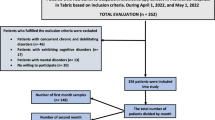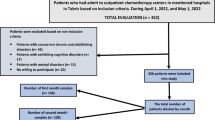Abstract
Only few studies have investigated the impact of surgery for rectal cancer on sexual function. Little of that research included quality of life (QoL) aspects and hardly any study analyzed the impact of age, gender and type of surgery on sexual function. The aim of the presented study was to address these issues. Over a 5 y period, EORTC-QLQ-C-30 and a tumor-specific module were prospectively administered to patients before surgery, at discharge, 3, 6, 12 and 24 months postoperatively. Comparisons were made between patients receiving abdominoperineal resection (APR), anterior resection (AR) with or without Pouch and Sigmoid resection. Furthermore, effects of surgery on female and male patients, and age groups were analyzed. A total of 819 patients participated in the study: 412 were males and 407 were females. The groups were comparable in terms of adjuvant treatment, tumor stage and histology. Patients after APR and AR with Pouch had worst sexual function. Men reported significantly more difficulties with sexual enjoyment; furthermore, over time, sexual problems created high levels of strain in men that were worse than baseline levels in the early postoperative period. These problems tended to remain. Patients aged 69 y and younger scored higher for problems with loss of sexual function and sexuality-related strain than patients aged 70 y and older. The findings in this study confirm that QoL changes postsurgery and that factors like type of surgery, gender and age have tremendous impact on sexual function and sexual enjoyment. APR and AR with Pouch affect sexual function more than AR and resection of the lower sigmoid. Through impaired sexual enjoyment, men are put more under strain than women. Patients aged 69 y and younger experience more stress through deteriorated sexual function.
This is a preview of subscription content, access via your institution
Access options
Subscribe to this journal
Receive 8 print issues and online access
$259.00 per year
only $32.38 per issue
Buy this article
- Purchase on Springer Link
- Instant access to full article PDF
Prices may be subject to local taxes which are calculated during checkout









Similar content being viewed by others
References
Becker N, Muscat JE, Wynder EL . Cancer morbidity in the United States and Germany. J Cancer Res Clin Oncol 2001; 127: 293–300.
Enker WE . Potency, cure, and local control in the operative treatment of rectal cancer. Arch Surg 1992; 127: 1396–1402.
Heald RJ, Ryall RDH . Recurrence and survival after total mesorectal excision for rectal cancer. Lancet 1986; 28: 1479–1482.
Chorost MI et al. Sexual dysfunction, informed consent and multimodality therapy for rectal cancer. Am J Surg 2000; 179: 271–274.
Chatwin NA, Ribordy M, Givel JC . Clinical outcomes and quality of life after low anterior resection for rectal cancer. Eur J Surg 2002; 168: 297–301.
Engel J et al. Quality of life in rectal cancer patients: a four-year prospective study. Ann Surg 2003; 238: 203–213.
Aaronson NK, Ahmedzai S, Bergman B . The European Organization for Research and Treatment of Cancer. QLQ C-30: a quality of life instrument for use in international clinical trials in oncology. J Natl Cancer Inst 1993; 85: 365–376.
Sprangers MA et al. The European Organization for Research and Treatment of Cancer approach to developing questionnaire modules: an update and overview. EORTC Quality of Life Study Group. Qual Life Res 1998; 7: 291–300.
Davidson-Homewood J et al. Development of a disease specific questionnaire to supplement a generic tool for QoL in colorectal cancer. Psychooncology 2003; 12: 675–685.
Fayers P, Aaronson N, Bjordal K, Sullivan M . EORTC QLQ-C30 Scoring Manual. EORTC Quality of Life Study Group: Brussels, 1995.
Pocard M et al. A prospective study of sexual and urinary function before and after total mesorectal excision with autonomic nerve preservation for rectal cancer. Surgery 2002; 131: 368–372.
Sprangers MA, te Velde A, Aaronson NK . The construction and testing of the EORTC colorectal cancer-specific quality of life questionnaire module (QLQ-CR38). European Organization for Research and Treatment of Cancer Study Group on Quality of Life. Eur J Cancer 1999; 35: 238–247.
Engel J et al. Comparison of breast and rectal cancer patients' quality of life: results of a four year prospective field study. Eur J Cancer Care 2003; 2: 215–223.
Camilleri-Brennan J, Steele RJC . Prospective analysis of quality of life and survival following mesorectal excision for rectal cancer. Br J Surg 2001; 88: 1617–1622.
Danzi M, Ferulano GP, Abate S, Califano G . Male sexual function after abdominoperineal resection for rectal cancer. Dis Colon Rectum 1983; 26: 665–668.
Wood-Dauphinee S . Assessing quality of life in clinical research: from where have we come and where are we going? J Clin Epidemiol 1999; 52: 355–363.
Balslev I, Harling H . Sexual dysfunction following operation for carcinoma of the rectum. Dis Colon Rectum 1983; 26: 785–788.
Maurer CA et al. Total mesorectal excision preserves male genital function compared with conventional rectal cancer surgery. Br J Surg 2001; 88: 1501–1505.
Maas CP et al. A prospective study on radical and nerve-preserving surgery for rectal cancer in the Netherlands. Eur J Surg Oncol 2000; 26: 751–757.
Holm T, Singnomklao T, Rutquist L-E, Cedermark B . Adjuvant preoperative radiotherapy in patients with rectal carcinoma. Adverse effects during long term follow up of two randomized trials. Cancer 1996; 78: 968–976.
Quah HM, Jayne DG, Eu KW, Seow-Choen F . Bladder and sexual dysfunction following laparoscopically assisted and conventional open mesorectal resection for cancer. Br J Surg 2002; 89: 1551–1556.
Mannaerts GH et al. Urologic and sexual morbidity following multimodality treatment for locally advanced primary and locally recurrent rectal cancer. Eur J Surg Oncol 2001; 27: 265–272.
Hjortrup A et al. Sexual dysfunction after low anterior resection for midrectal cancer. Acta Chir Scand 1984; 150: 687–688.
Maisey NR et al. Baseline quality of life predicts survival with advanced colorectal cancer. Eur J Cancer 2002; 38: 1351–1357.
McArdle CS, McMillan DC, Hole DJ . Male gender adversely affects survival following surgery for colorectal cancer. Br J Surg 2003; 90: 711–715.
EORTC study group on quality of Life. EORTC Quality of Life questionnaires. Available at http://www.eortc.be/home/qol/modules.htm. Accessed January 26, 2004.
Wiltink J et al. Validation of the German version of the International Index of Erectile Function (IIEF) in patients with erectile dysfunction, Peyronie's disease and controls. Int J Impot Res 2003; 15: 192–197.
Gacci M et al. Urinary symptoms, quality of life and sexual function in patients with benign prostatic hypertrophy before and after prostatectomy: a prospective study. Br J Urol 2003; 91: 196–200.
Derby CA et al. Measurement of erectile dysfunction in population-based studies: the use of a single question self-assessment in the Massachusetts Male Aging Study. J Impot Res 2000; 12: 197–204.
Kim NK et al. Assessment of sexual and voiding function after total mesorectal excision with pelvic autonomic nerve preservation in males with rectal cancer. Dis Colon Rectum 2002; 45: 1178–1185.
Nesbakken A et al. Bladder and sexual dysfunction after mesorectal excision for rectal cancer. Br J Surg 2000; 87: 206–210.
Küchler Th et al. Impact of psychotherapeutic support on gastrointestinal cancer patients undergoing surgery: ‘survival results of a trial’. Hepatopgastronenterology 1999; 46: 322–325.
Author information
Authors and Affiliations
Corresponding author
Rights and permissions
About this article
Cite this article
Schmidt, C., Bestmann, B., Küchler, T. et al. Factors influencing sexual function in patients with rectal cancer. Int J Impot Res 17, 231–238 (2005). https://doi.org/10.1038/sj.ijir.3901276
Received:
Revised:
Accepted:
Published:
Issue Date:
DOI: https://doi.org/10.1038/sj.ijir.3901276
Keywords
This article is cited by
-
Partnership, sexuality, and fertility-related communication: findings from a register-based study among long-term hematological cancer survivors
Supportive Care in Cancer (2023)
-
A longitudinal study of gender differences in quality of life among Japanese patients with lower rectal cancer treated with sphincter-saving surgery: a 1-year follow-up
World Journal of Surgical Oncology (2015)
-
Urinary and sexual dysfunction rates and risk factors following rectal cancer surgery
International Journal of Colorectal Disease (2015)
-
Postoperative bladder and sexual function in patients undergoing surgery for rectal cancer: a systematic review and meta-analysis of laparoscopic versus open resection of rectal cancer
Techniques in Coloproctology (2014)
-
Functional long-term results after rectal cancer surgery—technique of the athermal mesorectal excision
International Journal of Colorectal Disease (2014)



